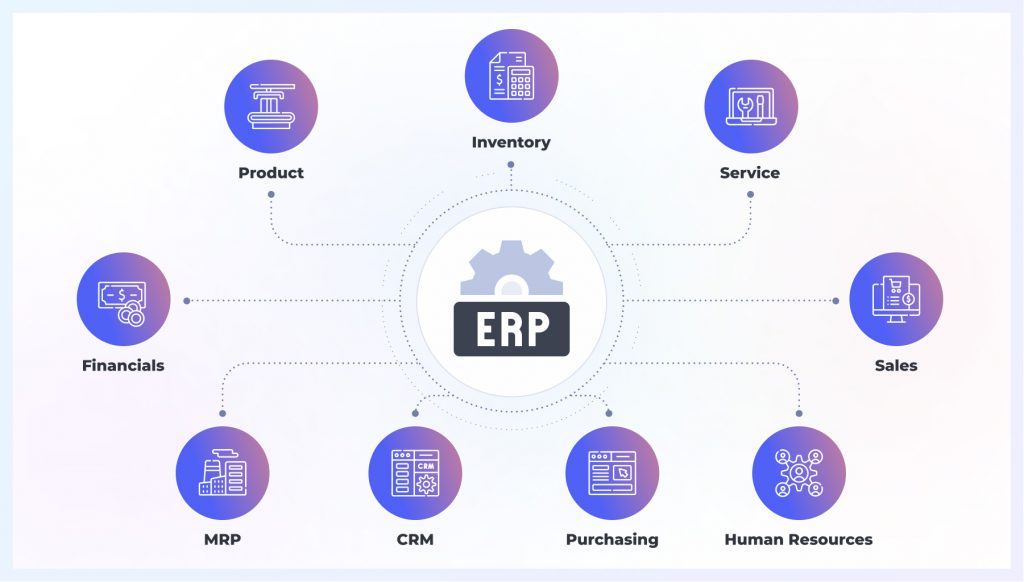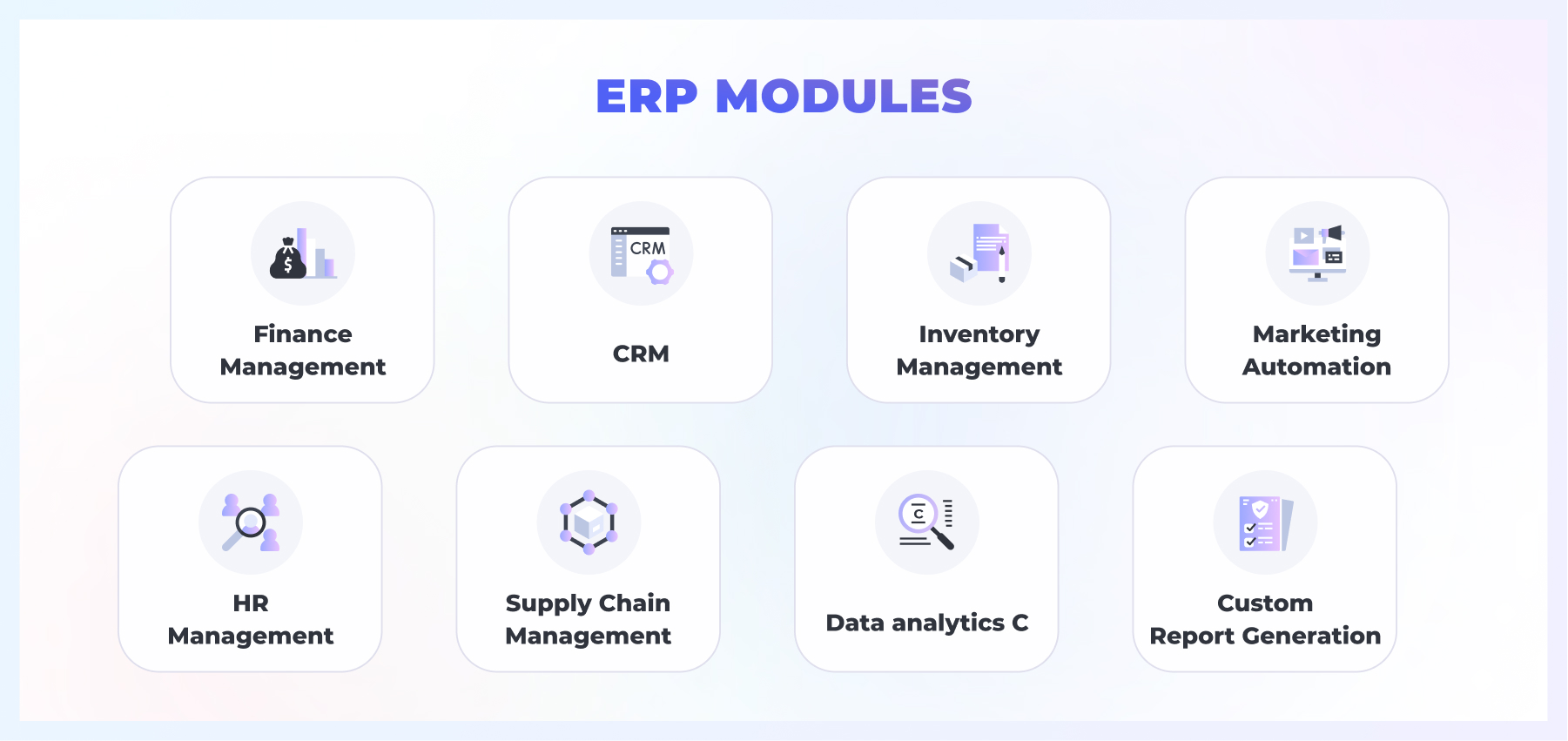Table of Contents
All business companies have many separate departments that are responsible for a particular range of tasks. However, it is still the entire company that needs to stay united and share information about all the updates inside the organization.
Each department needs to have access to the data from the other departments. The absence of a single unified system for the whole company complicates and delays many work processes and makes them slow and inefficient.
To avoid these awkward situations, your company needs smart software solutions that can sync the work of all the departments. Enterprise resource planning is this kind of solution.
In this article, we will discuss the details of how ERP functions, what the enterprise resource planning types are, and how to implement them successfully into your organization.
What is Enterprise Resource Planning?
Enterprise Resource Planning (ERP) solution unites all the company departments in a single system that shares access to business data for all employees. This system helps to accomplish all the daily tasks on time while making it easy to search for the required information.
Of course, here comes the need for the different levels of access. It is important to connect those departments that work directly with each other on a daily basis.
So, ERP is a business intelligence software solution that manages the company’s data, providing optimization and accessibility for the enterprise departments. Implementing ERP has many benefits for your enterprise as it makes the workflow more efficient. So ERP optimizes the following work processes:
- API access
- employee info and updates
- human resource management
- payment gateways
- receipts
- project management
- expense management
- asset management
Enterprise resource planning systems can be used in all business areas. However, there are some industries that have a special need only for one system and stable connections between the departments or even organizations. Among them are:
- Healthcare;
- Construction;
- Manufacturing and distribution;
- Food and beverage delivery;
- Education;
- Professional services;
- Hospitality;
- Agriculture and farming;
- Retail;
- Technology and electronics;
- Nonprofit organizations;
ERP is a flexible system that can be easily customized for a particular industry. Adding the needed business functions gives the ability to automate more work processes and make them faster and easier.
ERP types by the implementation
Besides different business areas, many ERP solutions can have different integration types, depending on the size of your organization and its requirements. Mainly, there are three of them:
- cloud-based;
- on-premise;
- hybrid;
ERP modules
Custom ERP platform is responsible for managing numerous processes within a particular organization, and the range of these processes depends on your individual needs and requirements. Custom ERP software can be integrated with diverse modules that are tasked with managing certain operations. Among the core modules that ERP should include are:
Common features of Enterprise Resource Planning
The ERP system brings a lot of benefits to your organization. It automates workflow, structure, and updates all data that needs to be saved. We defined the main features of ERP software integration that explain how your company can profit from using this system. They are the following:
Enterprise-wide integration
The company’s work processes concern all the departments. It is important to adjust and automate the workflow step-by-step with no possibility for errors.
Real-time operations
As the operations go through several departments and it takes several seconds, a key feature is to check the data quickly and accurately to reveal possible problems and fix them.
Database
Usually, the database includes data that should be defined and recognized by all departments with the same definition. Splitting the physical data can be used to improve performance.
Consistency
A consistent user interface is considered to be a more professional software solution. This way of creating UI design reduces costs as there is a need to create only a small number of reusable templates for the pages.
Benefits of ERP for enterprises
ERP, like any other software solution for business, needs investments and time for integration. If you think that this is too expensive and not really rational, we would like to show you why investing in ERP is worthwhile. As you may know, many enterprises still keep the old standards and don’t care about the technology implemented in their organizations. They tend to trust all work to employees that can let you down more often than technologies. ERP software takes your company to a higher level and keeps you ahead of your competitors. Implementing this system reduces the number of mistakes made by employees as some processes become automated. This will keep the highest rank on the market.
ERP systems work accurately and make customized reports. How can it help your business? With accurate and improved reports, your company can respond to complex data requests much more easily. Generally, it improves the efficiency of work processes and makes them faster.
Automation of some work processes with ERP gives more free time for employees to cope with other tasks. They can perform them more accurately, sensitively, and scrupulously. The more attention workers pay to tasks and their details, the higher quality of services you get. So with ERP, you can focus on other processes that matter instead of coping with numerous tasks with no enthusiasm.
Easy and fast access to customer information makes customer service improved and more productive. As ERP always updates the data, you will avoid mistakes and inaccuracies in the information. Also, ERP systems can have additional features like lead scoring that help to search for good leads and track the status of marketing campaigns. All in all, ERP makes the relationships between your company and customers much better and more efficient.
The main advantage of ERP software is access to information from different locations and mobile devices, for example, in the case of cloud-based integration. Users will always be informed about the latest updates and know the current situation. As ERP improves data consistency, you can be sure that it is safe and has no errors. If you want to make it even more secure, you can set different levels of data access for different departments and add built-in protection resources. This decreases the risk of your data exposure to third parties.
ERP systems examples
Surely, the variety of ready-made ERP systems is wide and continues to expand. Here is a compilation of the most widely-used ERP systems by companies of diverse industries all over the world:
- Microsoft Dynamics 365 – a cloud-based ERP solution that offers quite wide functionality among which are sales management, marketing automation, financial management, project service automation, and others.
- SAP Business One – a business management tool that is able to automate several company workflows such as financial reporting, HR, and other operations. Mostly used for small or mid-sized companies.
- Oracle NetSuite – a cloud-based ERP system that can help with financial management, inventory management, supply chain management, warehouse, and global business processes within the company.
- Sage X3 –another cloud-based worldwide ERP tool that provides common functionality like production and finance management, supply chain management, and project management.
However, the ready-made ERP solutions require contrasting payrolls due to the chosen pricing plans and most of them are not customizable at all which can become problematic for your business. Custom ERP development surely needs investment and some time to build and implement a top-notch solution but custom development guarantees 100% correspondence of the solution to your company’s requirements with the ability to scale and update the tool.
We are ready to help you define the core needs of your business company and create a step-by-step plan for developing and delivering high-grade custom ERP implementation to you.
How to implement ERP successfully?
The implementation of ERP software in your company is not a complex process. Before the start of integration, you need to go through crucial steps to make sure the ERP system works in your business organization. We prepared a list of the main tips for accurate implementation:
- The first and main is to define your business goals and needs, and then to build the strategy on how to reach all of them.
- Don’t ruin the old work processes at once – the integration should flow easily and softly for the workers.
- Build the right business plan and describe all work processes that can be automated
- It is important to choose suitable ERP software for your organization and maintain it well.
- The ERP system should be integrated into all departments with no exception to making the workflow more productive
- Choose the key employees that will be responsible for integration in every department.
- Make sure that all your employees are well-informed about the new system and its functions.
- Choose experienced specialists to manage data and maintain your ERP system.
Our expertise in ERP development
Learn more about the Altamira experience in building and delivering high-quality ERP systems to our clients.
ERP for aircraft selling company
Altamira developed the website for an aircraft sales company. Before contacting us, they had an old version of the website that wasn’t productive enough and had a poor design. Apart from providing the renewed design with colors, and patterns suitable for their industry, we developed a complex ERP system. So what features did the website gain after our work?
- Search for aircraft by filters – price, model, manufacturer, size
- model comparison
- ability to know the approximate price of the airplane and perform a range mapping
Moreover, customers can find a detailed description of every model of airplane-like weights, operating costs, cabin interior, and business performance. So all required information by customers can be found on their websites, so the owners don’t need to spend many costs to contact every customer personally.
ERP for service transport
Our team faced the challenges of automating the process of creating the lists of required parts of vehicles in the same order as they used to do it manually – a new list for every new order with detailed descriptions. The main aim of the ERP system for this company was to make this process easier and more accurate. After implementing the ERP system, customers can make orders, and employees can review these orders with the list of parts needed and send the full order to the car supplier. It reduces the risk of mixing app details and orders and helps to avoid misunderstandings with customers.
How much does an ERP development cost?
Like all software solutions for business, ERP systems have a particular range of functions and features that suit the chosen business industry and the company’s needs. You can discuss your requirements to implement in your company with our Business Analyst to find out the necessary functions and their estimation.
Before we show you the rough estimation of the custom ERP solutions, we’d like to offer you to review of the pricing of one of the most popular ready-made ERPs – Microsoft Dynamics 365. You will have to pay for the narrow range of functionality at least $1500 per tenant for 1 year. However, if you are willing to widen the options of your ERP system and get access to more advanced features, you will have to pay for each function separately, starting from $50 per user on a monthly basis. Well, the final cost can always vary and be pretty high, much more than a single investment into the custom ERP development.
Our experienced developer Evgen Bryl made an approximate estimation of ERP system development.
| Dev stages | Dev hours | Total cost |
| Business Analyst | 130 | $7410 |
| Admin | 32 | $1472 |
| Designer | 120 | $5400 |
| CSSHTML | 150 | $4500 |
| PHP backend | 600 | $36000 |
| JS frontend | 400 | $22800 |
| QA | 360 | $11880 |
| Scrum master | 270 | $13500 |
Generally, the cost of custom ERP development starts from $100000 and is variable due to the specifics and requirements of your organization.
Conclusion
ERP solutions offer numerous benefits to businesses and it is hard to underestimate them. Implementation of technologies in the business processes makes the work of the whole company faster, easier, and more productive. Human resources can cope with all amounts of new information accurately. That’s why you need to automate some work processes to avoid serious mistakes during work with customers.
If you don’t know where to start, you just need to contact a Business Analyst for a professional consultation and define the requirements of your company and the function of a custom ERP system. Choosing the right direction is a key step in the successful implementation of enterprise resource planning software.
FAQ
The most scalable type of ERP system is considered to be cloud-based integration. Besides the vendor taking part in your company’s performance, cloud-based integration suits large companies and small that are going to expand. There is an endless database for all information to be saved and shared between different locations easily. However, the type of implementation depends on the needs of your organization and should be discussed with the Business Analyst.
Customer relationship management systems are implemented to manage customer services and experience. ERP systems are used to automate and optimize business processes and department collaboration.
he total cost of ERP implementation varies and depends on the range of functions it will have. To choose these features, you need to define your company`s requirements and build the right strategy for integrating ERP in the work processes accurately. You need to contact an experienced Business Analyst to set the goals for your organization and create a strategy of aiming. In general, the price starts at $100000.




